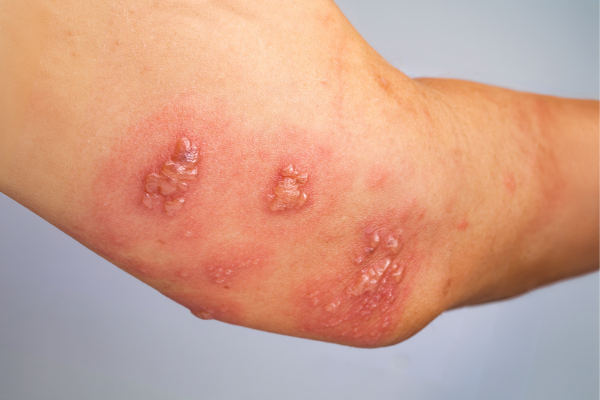Lymphocytic Colitis, Gut Health, and Collagen

The connection between lymphocytic colitis, gut health, and collagen
Lymphocytic colitis is an inflammatory bowel disease characterized by chronic inflammation of the colon, where a high concentration of lymphocytes (a type of white blood cell) is found in the intestinal tissue. This disease is part of a larger group of inflammatory bowel diseases that includes ulcerative colitis and Crohn's disease. Lymphocytic colitis causes symptoms such as diarrhea, abdominal pain, and weight loss, and can seriously affect the quality of life of those who suffer from it. The exact causes of lymphocytic colitis are not yet fully understood, but there is increasing interest in understanding how gut health, the immune system, and collagen interact in this disease.
Gut health is a central factor in the development of lymphocytic colitis, and there is a clear link between the gut microbiome and disease progression. The microbiome, the collection of bacteria and microorganisms that live in our gut, plays a crucial role in the function of the immune system and the body's response to inflammation. In the case of lymphocytic colitis, the barrier function of the gut and the composition of the microbiome are of paramount importance in preventing the escalation of inflammatory processes.
Collagen, a structural protein that forms an important part of connective tissue, also plays an important role in the mechanisms of the disease. Collagen is an essential component of the structure of the intestinal wall and can be affected by the inflammation caused by lymphocytic colitis. When the collagen in the intestinal tissue breaks down, it can lead to a weakening of the intestinal walls, which in turn can contribute to the worsening of the symptoms of the disease.
This article will examine the relationship between lymphocytic colitis, gut health, and collagen, providing insight into how these factors interact to influence the onset and progression of the disease. We will also discuss potential treatment strategies that may help improve gut health and manage collagen-related effects in lymphocytic colitis.
1. What is Lymphocytic Colitis?
Lymphocytic colitis is an inflammatory bowel disease characterized by the infiltration of lymphocytes into the intestinal tissue, especially the mucosa of the colon. The disease causes chronic inflammation that can lead to diarrhea, abdominal pain, and weight loss. It is a relatively uncommon disease and is often difficult to diagnose because its symptoms are similar to those of other inflammatory bowel diseases, such as ulcerative colitis and Crohn's disease.
Lymphocytic colitis most often affects older people, especially women, and symptoms can be periodic, with episodes of worsening followed by periods of relief. The exact cause of the disease is unknown, but several factors are thought to play a role in its onset, including genetic factors, immune system activity, and environmental influences such as diet and lifestyle.
The key histological feature that distinguishes lymphocytic colitis from other inflammatory bowel diseases is the presence of large numbers of lymphocytes in the intestinal mucosa. These cells are a type of white blood cell that is a central part of the immune system and play an important role in the body's response to infection and inflammation. In lymphocytic colitis, these cells are thought to infiltrate the intestinal wall in response to an unknown trigger, leading to inflammation and damage to the intestinal structure.
2. Gut Health and Lymphocytic Colitis
Gut health is a fundamental factor in the development and progression of lymphocytic colitis. The gut microbiome, which is composed of a variety of bacteria and microorganisms, plays a crucial role in regulating immune system function and maintaining a healthy gut barrier. Research has shown that dysbiosis, an imbalance in the microbiome, can contribute to the development of various inflammatory bowel diseases, including lymphocytic colitis.
The Microbiome and Inflammation
The microbiome has a strong influence on the function of the immune system and can both promote and inhibit inflammatory processes in the gut. A balanced intestinal flora helps to keep the immune system in check and prevents it from reacting to harmless substances, such as food or the gut's own cells. When this balance is disrupted and pathogenic bacteria begin to dominate, it can lead to excessive inflammation and immune activation, which in turn can cause intestinal problems and the development of diseases such as lymphocytic colitis.
In the case of lymphocytic colitis, research has shown that patients often have an altered gut flora with a reduced diversity of bacteria. Specifically, it has been found that there is a reduction in bacteria known to have anti-inflammatory properties, such as Lactobacillus and Bifidobacterium . This may contribute to the gut's immune system becoming overactivated and starting to attack the intestinal tissue, leading to the chronic inflammation that characterizes the disease.
Leaky Gut and Immune Response
Leaky gut is a condition in which the intestinal barrier function is impaired, allowing harmful substances, such as bacteria, toxins, and incompletely broken down food proteins, to leak into the bloodstream. This causes the immune system to react to these substances as if they were pathogens, which can trigger an inflammatory response.
In lymphocytic colitis, patients often have signs of leaky gut, which can exacerbate inflammation and contribute to the symptoms of the disease. The gut's influence on the immune system means that disruption of the microbiome and intestinal barrier can lead to systemic inflammation, which in turn can affect other parts of the body, including joints and skin.
3. Collagen and Lymphocytic Colitis
Collagen is a structural protein found in connective tissue and the walls of blood vessels, as well as in joints, skin and intestines. In the intestines, collagen is an important part of the structural integrity of the intestine and its ability to withstand mechanical stress. Collagen is found in the basement membrane of the intestine and is crucial for intestinal function and for maintaining an intact intestinal barrier.
In lymphocytic colitis, collagen can be affected by the inflammation caused by lymphocyte infiltration into the intestinal tissue. Chronic inflammation leads to the breakdown of collagen and other structural proteins in the intestinal walls. This can impair the intestine's ability to keep harmful substances out and make it more permeable to toxins and bacteria, which in turn worsens inflammation and leads to further damage.
Collagen in Intestinal Tissue
The intestinal wall is made up of several layers of tissue, with collagen playing a central role in providing strength and stability to the walls. When collagen is broken down due to inflammation, the structural integrity of the intestine can be compromised, which can lead to impaired function and worsening symptoms of lymphocytic colitis. In severe cases, the chronic inflammation can lead to fibrosis (scarring), where normal tissue is replaced with stiff connective tissue. Fibrosis can cause the intestinal wall to become thicker and less flexible, which can worsen symptoms and make the disease more difficult to treat.
Collagen Production and Weakened Barrier Function
In lymphocytic colitis, the inflammation caused by the lymphocytes attacking the intestinal tissue can increase collagen production in an attempt to repair the damaged tissue. This can lead to excessive collagen production and fibrosis. The weakened barrier function makes the intestine more susceptible to further infection and inflammation, which can lead to a vicious cycle of damage and recurrent inflammation.
4. Treatment and Management of Lymphocytic Colitis
Treatment for lymphocytic colitis focuses on reducing inflammation, relieving symptoms, and preventing long-term damage to the intestine. There are various treatment strategies that can help manage the disease and the collagen-related effects of inflammation.
Diet and Probiotics
One of the most important factors in supporting gut health is diet. A diet rich in anti-inflammatory foods, such as vegetables, whole grains, and fatty fish, can help reduce inflammation and strengthen the gut barrier. Probiotics, which contain live bacteria, can also help restore healthy gut flora and improve immune function. Prebiotics, which are foods that promote the growth of good bacteria, can also be useful in supporting the gut microbiome.
Treatment of Collagen-Related Injuries
To manage collagen-related problems in lymphocytic colitis, it may be helpful to support collagen production through dietary supplements containing collagen peptides. These supplements can help strengthen the intestinal walls and improve the structure of intestinal tissue. In severe cases of fibrosis, medications that target inflammation and collagen production may be helpful in reducing damage to the intestinal walls.
Conclusion
The relationship between lymphocytic colitis, gut health, and collagen is complex and involves multiple factors that interact to influence the onset and progression of the disease. Gut dysbiosis and impaired gut barrier function play a central role in triggering inflammation and the development of the disease. Collagen, which is an important component of the structural integrity of the gut, can be negatively affected by inflammation, leading to increased vulnerability to further damage. By understanding these relationships and by applying appropriate treatments, we can improve the quality of life of people suffering from lymphocytic colitis and support their recovery.






